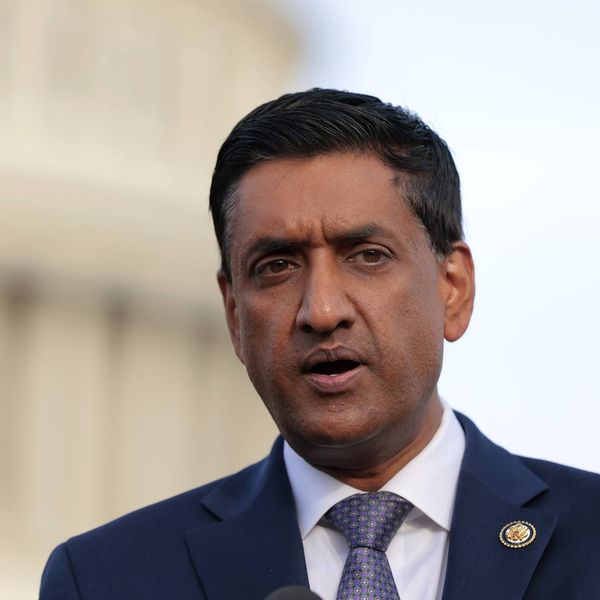A Few Good (and Fair) Tax Hikes
While the New Year's deficit deal divided congressional Republicans, there's one point on which they're all reading from the same hymnal: No more tax talk! The revenues under the deal are relatively modest--they leave rich people's taxes well short of Clinton era rates.
While the New Year's deficit deal divided congressional Republicans, there's one point on which they're all reading from the same hymnal: No more tax talk! The revenues under the deal are relatively modest--they leave rich people's taxes

The truth is, we could do our economy a world of good with some smart and fair tax hikes. While the current deficit hysteria is unmoored from reality, the right tax hikes could improve economic incentives, reduce obscene inequality and fund much-needed programs. Rather than the usual dust-ups over competing flavors of austerity, our budget debate should have healthy tax hikes front and center.
To start with, Congress should listen to Sarah Anderson, who directs the Global Economy Project at the Institute for Policy Studies. As Anderson noted at The Huffington Post last week, while progressive taxation may appear an uphill battle, politics is fluid, and "Openings will come.... The even more important challenge is to push progressive reforms into the center of the debate so they get plucked when the stars are aligned."
Anderson has a few good taxes in mind to start with. First: Close the carried-interest loophole, so that money made by managing private equity or hedge funds no longer gets preferential treatment over wages earned by teaching kids or mining coal (President Obama offered welcome support for this change in his Super Bowl Sunday interview). Second: Cap executive pay deductibility, so that calling obscene bonuses "performance-based" no longer lets them be easily exempted from taxation. Third: Tax financial transactions, so bad behavior can be discouraged, and the people who crashed the economy can be required to pay for the cost of recovery. And fourth: Shut down offshore tax haven loopholes, so our tax code stops seducing money away from America.
Each of these tax changes would be a victory for the 99 percent, and a step towards economy sanity. We have a long way to go. As Oxfam International wrote in a briefing published last month, the world's 100 richest billionaires alone last year made four times as much money as it would have taken to end extreme poverty. While "great progress" has been made in the fight to improve the lives of the world's poorest, Oxfam warns, "as we look to the next decade, and new development goals we need to define progress, we must demonstrate that we are also tackling inequality--and that means looking at not just the poorest but the richest.... In a world of finite resources, we cannot end poverty unless we reduce income inequality."
The Republican Party will pull out all the stops to avert any progress on taxes. But as House Ways and Means Committee Chair Dave Camp reminded us last month, even GOP congressmen know that taxing the wealthiest is politically popular. GOP sources told The Huffington Post's Ryan Grim and Zach Carter that Camp is considering legislation that could transform the tax treatment of derivatives, discouraging extreme risk-taking and recouping little-taxed profit. Ironically, Grim and Carter's sources suggested that the bill was motivated by payback: Camp resented top CEOs for supporting the (quite conservative) Fix the Debt in calling for a Grand Bargain, rather than taking the Grover Norquist line and refusing to entertain any tax increases at all. But if true, the story is telling: It shows that Republicans know that their CEO friends are depending on them to shield them from reasonable taxation, and that the top 1 percent are vulnerable to public outrage if a true tax debate breaks out.
That's the debate we need now. It's time for a few good tax hikes.
An Urgent Message From Our Co-Founder
Dear Common Dreams reader, The U.S. is on a fast track to authoritarianism like nothing I've ever seen. Meanwhile, corporate news outlets are utterly capitulating to Trump, twisting their coverage to avoid drawing his ire while lining up to stuff cash in his pockets. That's why I believe that Common Dreams is doing the best and most consequential reporting that we've ever done. Our small but mighty team is a progressive reporting powerhouse, covering the news every day that the corporate media never will. Our mission has always been simple: To inform. To inspire. And to ignite change for the common good. Now here's the key piece that I want all our readers to understand: None of this would be possible without your financial support. That's not just some fundraising cliche. It's the absolute and literal truth. We don't accept corporate advertising and never will. We don't have a paywall because we don't think people should be blocked from critical news based on their ability to pay. Everything we do is funded by the donations of readers like you. Will you donate now to help power the nonprofit, independent reporting of Common Dreams? Thank you for being a vital member of our community. Together, we can keep independent journalism alive when it’s needed most. - Craig Brown, Co-founder |
While the New Year's deficit deal divided congressional Republicans, there's one point on which they're all reading from the same hymnal: No more tax talk! The revenues under the deal are relatively modest--they leave rich people's taxes

The truth is, we could do our economy a world of good with some smart and fair tax hikes. While the current deficit hysteria is unmoored from reality, the right tax hikes could improve economic incentives, reduce obscene inequality and fund much-needed programs. Rather than the usual dust-ups over competing flavors of austerity, our budget debate should have healthy tax hikes front and center.
To start with, Congress should listen to Sarah Anderson, who directs the Global Economy Project at the Institute for Policy Studies. As Anderson noted at The Huffington Post last week, while progressive taxation may appear an uphill battle, politics is fluid, and "Openings will come.... The even more important challenge is to push progressive reforms into the center of the debate so they get plucked when the stars are aligned."
Anderson has a few good taxes in mind to start with. First: Close the carried-interest loophole, so that money made by managing private equity or hedge funds no longer gets preferential treatment over wages earned by teaching kids or mining coal (President Obama offered welcome support for this change in his Super Bowl Sunday interview). Second: Cap executive pay deductibility, so that calling obscene bonuses "performance-based" no longer lets them be easily exempted from taxation. Third: Tax financial transactions, so bad behavior can be discouraged, and the people who crashed the economy can be required to pay for the cost of recovery. And fourth: Shut down offshore tax haven loopholes, so our tax code stops seducing money away from America.
Each of these tax changes would be a victory for the 99 percent, and a step towards economy sanity. We have a long way to go. As Oxfam International wrote in a briefing published last month, the world's 100 richest billionaires alone last year made four times as much money as it would have taken to end extreme poverty. While "great progress" has been made in the fight to improve the lives of the world's poorest, Oxfam warns, "as we look to the next decade, and new development goals we need to define progress, we must demonstrate that we are also tackling inequality--and that means looking at not just the poorest but the richest.... In a world of finite resources, we cannot end poverty unless we reduce income inequality."
The Republican Party will pull out all the stops to avert any progress on taxes. But as House Ways and Means Committee Chair Dave Camp reminded us last month, even GOP congressmen know that taxing the wealthiest is politically popular. GOP sources told The Huffington Post's Ryan Grim and Zach Carter that Camp is considering legislation that could transform the tax treatment of derivatives, discouraging extreme risk-taking and recouping little-taxed profit. Ironically, Grim and Carter's sources suggested that the bill was motivated by payback: Camp resented top CEOs for supporting the (quite conservative) Fix the Debt in calling for a Grand Bargain, rather than taking the Grover Norquist line and refusing to entertain any tax increases at all. But if true, the story is telling: It shows that Republicans know that their CEO friends are depending on them to shield them from reasonable taxation, and that the top 1 percent are vulnerable to public outrage if a true tax debate breaks out.
That's the debate we need now. It's time for a few good tax hikes.
While the New Year's deficit deal divided congressional Republicans, there's one point on which they're all reading from the same hymnal: No more tax talk! The revenues under the deal are relatively modest--they leave rich people's taxes

The truth is, we could do our economy a world of good with some smart and fair tax hikes. While the current deficit hysteria is unmoored from reality, the right tax hikes could improve economic incentives, reduce obscene inequality and fund much-needed programs. Rather than the usual dust-ups over competing flavors of austerity, our budget debate should have healthy tax hikes front and center.
To start with, Congress should listen to Sarah Anderson, who directs the Global Economy Project at the Institute for Policy Studies. As Anderson noted at The Huffington Post last week, while progressive taxation may appear an uphill battle, politics is fluid, and "Openings will come.... The even more important challenge is to push progressive reforms into the center of the debate so they get plucked when the stars are aligned."
Anderson has a few good taxes in mind to start with. First: Close the carried-interest loophole, so that money made by managing private equity or hedge funds no longer gets preferential treatment over wages earned by teaching kids or mining coal (President Obama offered welcome support for this change in his Super Bowl Sunday interview). Second: Cap executive pay deductibility, so that calling obscene bonuses "performance-based" no longer lets them be easily exempted from taxation. Third: Tax financial transactions, so bad behavior can be discouraged, and the people who crashed the economy can be required to pay for the cost of recovery. And fourth: Shut down offshore tax haven loopholes, so our tax code stops seducing money away from America.
Each of these tax changes would be a victory for the 99 percent, and a step towards economy sanity. We have a long way to go. As Oxfam International wrote in a briefing published last month, the world's 100 richest billionaires alone last year made four times as much money as it would have taken to end extreme poverty. While "great progress" has been made in the fight to improve the lives of the world's poorest, Oxfam warns, "as we look to the next decade, and new development goals we need to define progress, we must demonstrate that we are also tackling inequality--and that means looking at not just the poorest but the richest.... In a world of finite resources, we cannot end poverty unless we reduce income inequality."
The Republican Party will pull out all the stops to avert any progress on taxes. But as House Ways and Means Committee Chair Dave Camp reminded us last month, even GOP congressmen know that taxing the wealthiest is politically popular. GOP sources told The Huffington Post's Ryan Grim and Zach Carter that Camp is considering legislation that could transform the tax treatment of derivatives, discouraging extreme risk-taking and recouping little-taxed profit. Ironically, Grim and Carter's sources suggested that the bill was motivated by payback: Camp resented top CEOs for supporting the (quite conservative) Fix the Debt in calling for a Grand Bargain, rather than taking the Grover Norquist line and refusing to entertain any tax increases at all. But if true, the story is telling: It shows that Republicans know that their CEO friends are depending on them to shield them from reasonable taxation, and that the top 1 percent are vulnerable to public outrage if a true tax debate breaks out.
That's the debate we need now. It's time for a few good tax hikes.

